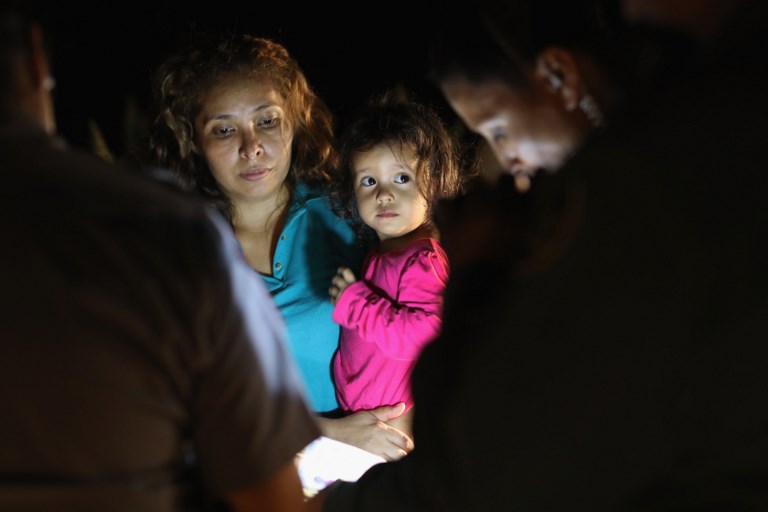
This file photo taken on June 12, 2018 shows Central American asylum seekers, including a Honduran girl, 2, and her mother, near the US-Mexico border in McAllen, Texas./ AFP PHOTO / GETTY IMAGES NORTH AMERICA / John MOORE
LOS ANGELES – A US judge on Monday gave the government more time to reunite migrant children aged five or younger with their parents separated as a consequence of a “zero tolerance” policy, US media reported.
The decision came after a government lawyer said around half of the 102 young children could be placed back with their parents by the previously given deadline of Tuesday.
They are among more than 2,300 children split up from their families as a consequence of the “zero tolerance” practice that saw their parents prosecuted for illegally crossing the border, even if they did so to seek asylum.
Many are fleeing gang violence and poverty in Central America.
Following domestic and global outcry over the separations, in which some children were kept in chain-link enclosures, Trump ended the practice on June 20.
The problem is that this meant children had to be kept with their detained parents.
So the Justice Department asked a federal judge to amend a 1997 ruling that children could not be held for more than 20 days while their parents are in court proceedings.
But this judge, Dolly Gee, ruled late Monday, after the deadline extension, that she rejected the idea of keeping unauthorized migrant kids in custody indefinitely as the government sought. She said the kids were blameless and such an arrangement was not in their best interest.
The New York Times reported late last week that, under pressure to reunite the families, authorities were struggling to connect them after records linking children to their parents disappeared and in some cases were destroyed, though not as part of a deliberate attempt to obfuscate.
At the hearing in San Diego, Judge Dana Sabraw gave the authorities extra time to determine which children will be back with their parents, as government lawyer Sarah Fabian said 54 of the youngsters could be reunited by the Tuesday deadline, the US media reports said.
Sabraw previously ordered that thousands more children aged five and older should be back together with their parents by July 26, but Monday’s hearing did not touch on their cases.
The government on Friday asked for an extension of the deadline, saying it needed more time to find and confirm the identities of the children and parents.
That prompted the court to order the government to submit a list of children younger than five, and it do so over the weekend, the ACLU said, by presenting the list of 102 children.
Despite the delays, Sabraw reportedly said he had seen “real progress and I’m optimistic that many of these families will be reunited tomorrow, and then we’ll have a very clear understanding as to who has not been reunited, why not, and what time-frame will be in place.”
The American Civil Liberties Union, which brought the case that led to Sabraw’s initial injunction on behalf of migrant parents, said the court is “holding the Trump administration’s feet to the fire” to accomplish reunification.
“It’s extremely disappointing the government will not be in full compliance with the court order, but the judge has stepped in to manage this mess of the administration’s making,” Lee Gelernt, deputy director of the ACLU’s Immigrants’ Rights Project, said in a statement.
During separation, parents were sent into federal custody while the children were taken by the Department of Health and Human Services (HHS) and held at holding facilities often thousands of miles (kilometers) from their parents.
HHS admitted it had resorted to DNA testing on some of the children to try to match them with their parents.
In total, the authorities are holding around 11,800 minors who crossed the border illegally. Around 80 percent of them are teenagers who tried to make the crossing without their parents, HHS Secretary Alex Azar has said.